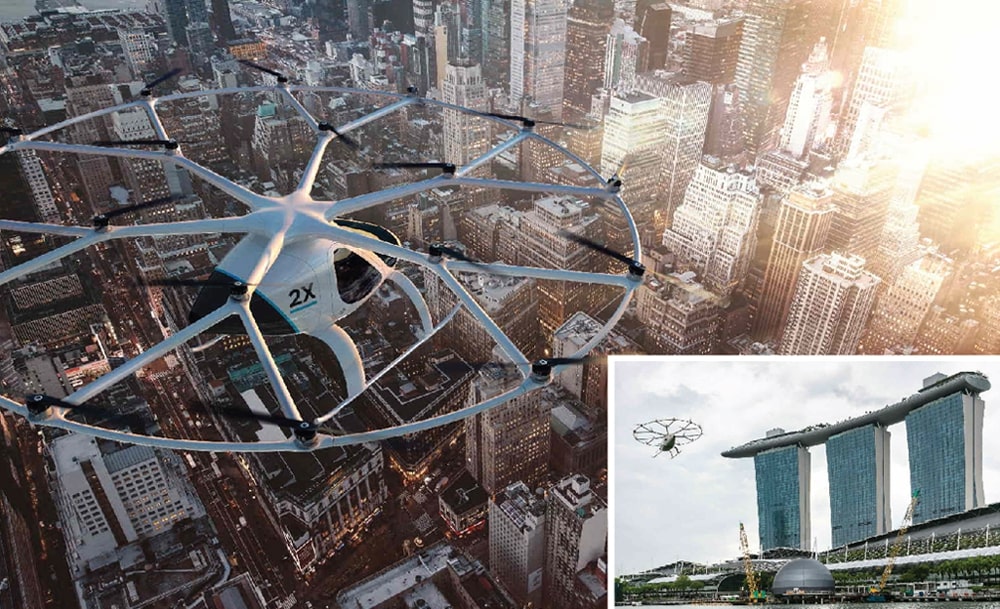July 2020: Muscat, Oman: Founded in 2011, Volocopter developed the world’s first electric autonomous multi-rotor aircraft using drone technology and aims to provide point-to-point air transportation services in urban areas.
After its successful public manned flight in the Gulf of Singapore last year, Volocopter has begun laying the groundwork for its future commercialization.
Driven by state-of-the-art technology, Geely Holding Group had invested in Germany-based flying-car developer Volocopter GmbH. Geely, which owns Volvo Cars and has a stake in Daimler AG, led a round of investment that raised 50 million euros ($55 million) to help the VoloCity air taxi launch commercially within the next three years. Geely’s investment comes as the world is looking towards new-energy vehicles, rather than internal-combustion engines, in a bid to reduce air pollution.
Mr. Jan-Hendrik Boelens, the CTO of Volocopter, recently spoke about the future of air travel and how the brand is taking future mobility to the next level. On the inspiration to start developing air taxis, he said, “Our co-founder, Stephan Wolf, first came into contact with drones in 2010 when he bought one for his son. He was amazed at how easy it was to fly this technology and got curious – if it was scaled up to a size and remained as easy and stable, that humans could fly with it. After a few months of calculations, he was convinced that it was possible and found partners to help make the first proof of concept. Once proven that the technology was indeed feasible, the Volocopter founders quickly came up with hundreds of possible applications for this new kind of aircraft – adding a completely new means of mobility to cities and bringing Urban Air Mobility to life, is what we continue to focus on.”
Speaking on Volocopter’s initial test flight in Singapore and the company’s future plans he said, “We have repeatedly shown that our technology works during public test flights like the one in Singapore. Such flights are important steps on our way to receiving commercial certification for our air taxi and implementing the first Urban Air Mobility routes in the next two to four years. We believe that acceptance is one of the key factors when it comes to the implementation of a new technology. Allowing people to experience this technology and raising peoples’ awareness, as these flights do, will play a big role on our road to commercialization.”
On the technological issues faced by urban air mobility he added, “We are building our VoloCity aircraft with a strict focus on its mission in the urban context. With this very specific mission profile, it is easier to optimize for the most important aspects. For us, these are safety, noise, and a low trip cost. The decision to focus on the city mission has significantly informed the design for our aircraft. How exactly, you can learn on our website Volocopter.com. Safety is ensured through redundancy in all flight-critical components and the rigorous certification process through the EASA. Our 18 rotors and large rotor area enable a low noise profile, which is key in ensuring public acceptance.”
With regards to constructing urban air travel systems and the challenges that are likely to be encountered during its implementation, Mr. Jan-Hendrik Boelens commented saying, “Real estate in cities and especially busy areas, where it would be valuable to have Volocopters’ land, is both rare and expensive. However, building a VoloPort will be affordable when compared to building whole street networks or subway networks and will take just a few months to construct. We are working together with partners who have already been buying up relevant real estate in interesting cities and are working on certifying eVTOL-specific ‘vertiports’. On top of that, we have been receiving interest from real-estate developers for more than two years now, who want to integrate this new kind of mobility infrastructure in their houses. As such, we know that this too is a solvable challenge.”
With Geely investing and being responsible for the production of Volocopter products in China, Boelens also commented on Volocopter’s vision for the Chinese market saying, “China has some of the largest metropolitan areas in the world, and so the Chinese market is a very interesting one for Volocopter, and very well suited for the unique design of our VoloCity. With Geely, we have a strong partner by our side to implement this technology in one of the fastest-growing economies worldwide.”
Geely also has investments in US-based Terrafugia flying cars, Lotus racing cars, London Taxi Company and Proton, offering their customers the best technology and innovations. Geely has set the benchmark high in safety, style and performance with the introduction of new technology that improves the efficiency of its cars whilst at the same time being environmentally friendly and offering an overall amazing driving experience to its customers.
Towell Auto Centre (TAC), the sole distributor of Geely vehicles in the Sultanate of Oman, has built the trust of customers, over the decades. A spokesperson of TAC said, “For several years, Geely has been on a technology acquisition spree. Over 7000 customers in Oman are appreciating the aerodynamic styling and C-NCAP five-star safety standard, thanks to ex-Volvo design Chief Peter Horbury coming onboard. With a constant drive to extend their horizons with regards to technology and mobility, urban air travel and future air mobility will surely be redefined by Volocopter and Geely together.”
Customers can visit any of the 8 Towell Auto Centre (TAC) showrooms in Oman and explore more with the new world of Geely.


